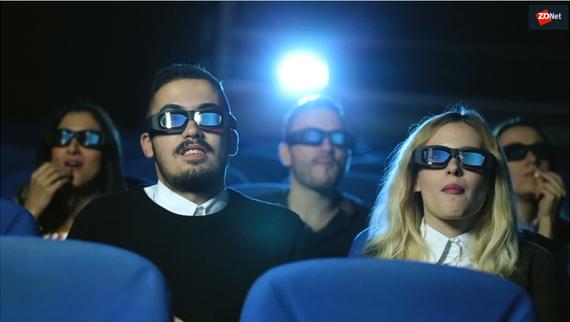Pirate “cam” copies of movies may one day be a thing of the past, thanks to a new patent.
Content creators and cinemas have tried everything from piracy-busting patrols to embedded watermarks, but nothing seems to be making a dent in film piracy.
So-called “cam” copies of new films often appear online a week or two after public release in cinemas, and far sooner than official DVD or Blu-Ray copies hit the market. Those who do not want to see the movie in theatre can then download these movies for free through torrent software, albeit illegally.
As they are recorded in cinema, the quality is generally poor, especially in comparison to true copies of the film due to rustling, poorly-captured video and audio, as well as the occasional person leaving their seat obstructing the view.
Despite the drawbacks of cam copies, downloading and sharing remains popular. However, Philips hopes that a new solution will stop cams being recorded in the first place, a technology likely to appeal to content creators and cinemas alike.
According to a patent application submitted to the United States Patent and Trademark Office (USPTO) by the tech giant, the invention uses ambient lighting to hinder films being recorded illegally in cinemas.
The technology utilizes liquid crystals to clutter video frames with noise, objects, and shading. In addition, a light would be shone at a certain frequency which runs out of sync with the movie content, and so any illegal recordings will contain stripes, rendering the recording unusable.
While the lighting would not obscure the viewing quality as long as people are watching through synchronized polarized active shutter glasses — similar to glasses used in 3D cinemas — which filter out these objects, if a camcorder attempts to record the screen, the footage itself will be obscured.
“The glasses should be able to filter out the noise or other images so that people wearing the glasses see the main content,” the patent reads. “In contrast, camcorders trained on the screen or people not wearing the glasses should see the video in obscured form.”
This would require cinema visitors to wear glasses to watch films, but the patent goes further. Philips also describes another form of the invention which would also potentially stop the unauthorized viewing of pay-per-view events.
Even if events have been purchased legally, the company says, cable providers may want to “limit how many people are authorized to gather around the television and watch the event,” and so using the same kind of technology could — eventually — enforce content restrictions in the home.
This is not the first time Philips has developed technology aimed at reducing piracy. Back in 2012, the company rolled out CineFence, forensic marking technology which allows image and audio files to be tracked, even when compressed for release online.


Leave a Reply